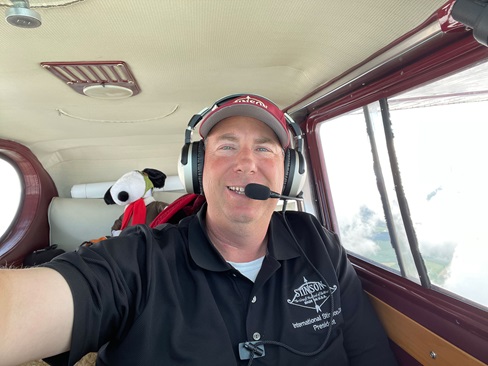License to learn: Two minds—if you don’t mind
You are only as good as your basic training
 My father told me, “Never to go to bed without having a really good question on your mind.” I told him I’d think about it.
My father told me, “Never to go to bed without having a really good question on your mind.” I told him I’d think about it.
In fact, I have faithfully followed that advice for decades, although I occasionally find myself asking, “Why am I not getting much sleep?” One lobe-worthy question that’s kept the sandman away over the years is the aviation educator’s response to the question, “Why do I need to spend so much time practicing the basic fundamentals of flight?”
Despite flapping our regio oralis (lips) in support of sustaining higher skills by practicing basic ones, we offer little more than lackluster responses. At least I’ve not heard an answer that would inspire anyone to leap from their couch, race to the airport, and perform precision dead-stick landing simulations.
So, why do you need to be proficient at entering and exiting slow flight at minimum controllable airspeed? Why should you practice forward slips, stall and spin-entry recoveries, or even coordination rolls? Why should you spend your flying cash on strengthening these and other basic flying skills?
If you stop and think about it, there really is a good answer to this question and it has everything to do with not thinking about it.
Pilots are of two minds during flight. There’s our conscious mind, which asks the questions, plots strategy, and executes a plan. Then there’s our reflexive mind, which works behind the scenes to control almost everything the conscious mind doesn’t think about. It’s our reflexive mind that responds based on habit formation (training) and biological programming (instinct), generally in that order.
When your conscious mind is engaged by a good distraction or adrenaline-induced tunnel vision (i.e., an emergency, for instance), your reflexive mind has the helm to itself. The more you’re focused on something other than flying the airplane, the more your reflexive mind is PIC. This is especially true when the chips are down.
Here’s an example of how your conscious mind attends to more pressing concerns while relying on your reflexive mind to do the flying. Suppose you’re in cruise flight and experience a sudden and urgent need to visit the loo. You’re now piloting a Loo2. As you make a harried descent to a nearby airport, you attempt to obtain the loo-down from unicom on the loo’s airport location and whether or not it’s presently occupied. All the while, you’re having a devil of a time concentrating on flying your airplane (that’s the work of loo-cifer).
With your conscious mind distracted, do you have any doubt that your ability to make a coordinated turn from base to final is now primarily dependent on how well your reflexive mind has mastered the basic fundamentals of flight? You know this is true. Don’t deny it. You certainly aren’t thinking about how P-factor affects your turn (at least not that type of P-factor). Here is where insufficient airspeed and cross-control malfeasance might easily offer you a ticket to Spin City.
The fact is that your conscious mind can and does go temporarily AWOL on almost every flight, especially when adrenaline—or other liquids—is involved. It can happen when passengers distract you, your engine hiccups, or if you’re worried about finding fuel. It’s an endless list. When it happens, you are only as good as your basic training.
And that, my friends, is the answer to the question, “Why do I need to spend so much time practicing the basic fundamentals of flight?”
On your next flight, when passing through the practice area, take some time to fly really slowly. Test your proficiency at coordination. See how quickly you can establish yourself in the attitude for a power-off glide at best glide speed. These are just a few of the basics we depend on to keep us safe in flight.
Me? I’m going to try to get some sleep.
Web: www.rodmachado.com


